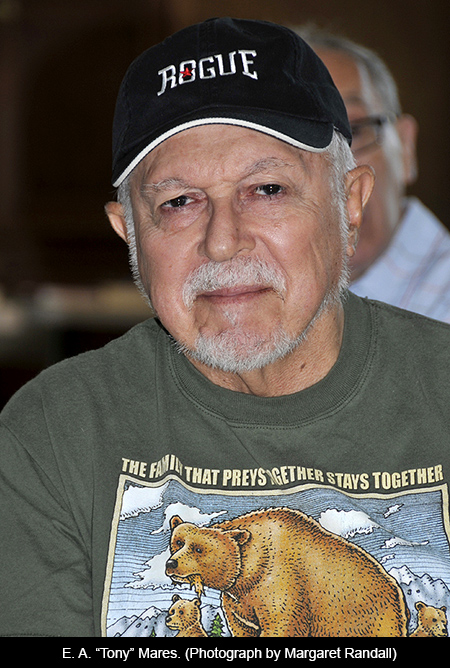
Albuquerque, New Mexico, the world of justice, and poetry lost E. A. “Tony” Mares just after noon on January 30, 2015. Tony was gentle and kind but tough and righteous when the situation called for those qualities. With deep roots in this land and its people, his scholarship extended to Spain and Mexico in search of early events and figures of relevance; and showed up in his prolific poetry, articles, and in the memories of generations of grateful students.
Tony suffered from idiopathic pulmonary fibrosis. When it worsened, he had to use portable oxygen. His doctor advised him to seek a lower altitude where he might add years to his life. He preferred to run the risk of earlier death where he felt he belonged, right here in New Mexico where his forebears had made their lives. Sometimes, in heated discussion at some café, he would remove his oxygen tubing for a while—just to feel less encumbered. He died on the birthday of his maternal grandmother, Rebecca Gutiérrez Devine, a longtime reference for him.
Where justice needed a voice, Tony offered his: with the Civil Rights marchers in the South, in northern New Mexico where people suffered and still suffer from lack of healthcare and other rights, and in classrooms where truth is needed to counteract a fabricated history. Tony was a historian and scholar as well as a poet. He didn’t suffer fools easily, but always reasoned with facts and empathy rather than stoop to others’ levels of ignorance, disdain and bigotry.
In October I published two poems by Tony on the Duke City Fix’s “Sunday Poetry” section I’ve been curating. One of them was, Depression:
In a harsh voice
depression squawked
at me. Like a shroud,
it spread its wings,
a dark haloing
over my shoulders.
Then it shat on me.
Ungrateful bird.
He wrote this poem in early September 2014, less than four months before his death. Surely he had solid reasons to feel depressed, but the last two lines reflect his attitude toward life and the hand it dealt him: look it squarely in the face and then respond with a lifetime of knowledge and humor.
E.A. “Tony” Mares leaves a rich legacy of books, anthologized poems, articles, even a play. I urge readers to explore this legacy. You won’t be disappointed. By keeping Tony’s work close, by using it, we remain faithful to his generous life.



Responses to “Goodbye, Tony”